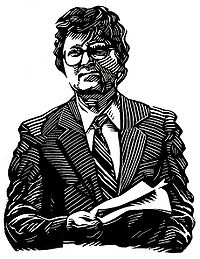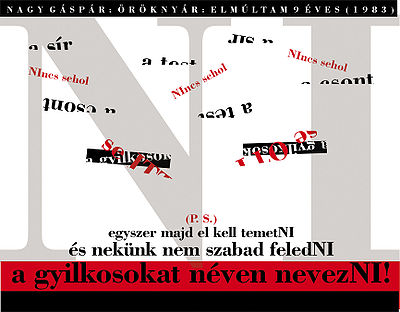
Gáspár Nagy
Encyclopedia

Hungary
Hungary , officially the Republic of Hungary , is a landlocked country in Central Europe. It is situated in the Carpathian Basin and is bordered by Slovakia to the north, Ukraine and Romania to the east, Serbia and Croatia to the south, Slovenia to the southwest and Austria to the west. The...
poet
Poet
A poet is a person who writes poetry. A poet's work can be literal, meaning that his work is derived from a specific event, or metaphorical, meaning that his work can take on many meanings and forms. Poets have existed since antiquity, in nearly all languages, and have produced works that vary...
and writer
Writer
A writer is a person who produces literature, such as novels, short stories, plays, screenplays, poetry, or other literary art. Skilled writers are able to use language to portray ideas and images....
.
Life
He graduated from the Benedictine Grammar School of Pannonhalma where he studied Library Science in SzombathelySzombathely
Szombathely is the 10th largest city in Hungary. It is the administrative centre of Vas county in the west of the country, located near the border with Austria...
, then Aesthetics and Sociology in Budapest.
He was editor of Móra Ferenc Publishing House (1976–1980), secretary of Hungarian Writer’s Association (1981–85), co-editor, with Sándor Csoóri
Sándor Csoóri
Sándor Csoóri is a Hungarian poet, essayist, writer and politician.-Biography:In 1950, he graduated from the Reformed Pontifical College , and then studied at ELTE Institute, but dropped his studies because of illness...
, of Hitel the first legally-permitted oppositional periodical (1988–2007) and literary editor of the Hungarian Catholic Radio (2003–2007).
In 1974, he married Marta Szabo; they had one son, and two daughters.
From the very beginning his poetry was determined by the ideas of the two important facts of the Central-European history: 1956 and 1968. The Budapest Autumn and the Prague Spring
Prague Spring
The Prague Spring was a period of political liberalization in Czechoslovakia during the era of its domination by the Soviet Union after World War II...
motivated him to protest against the Communist dictatorship and his poems stimulated the democratic changes in Hungary in 1989. His legendary “political system changing” poem "Öröknyár, elmúltam kilenc éves", (Eternal Summer: I’m Over Nine) was published in 1984 in the October issue of the Új Forrás periodical. The brave poem was about the unmarked grave of Imre Nagy
Imre Nagy
Imre Nagy was a Hungarian communist politician who was appointed Chairman of the Council of Ministers of the People's Republic of Hungary on two occasions...
(he was the executed prime minister in the 1956 revolution), and about the unnamed murderers.
“One day he must be buried
and we must not forget
to appoINt the murderers!"
The hidden initials of Imre Nagy
Imre Nagy
Imre Nagy was a Hungarian communist politician who was appointed Chairman of the Council of Ministers of the People's Republic of Hungary on two occasions...
(NI - in Hungary the given name
Given name
A given name, in Western contexts often referred to as a first name, is a personal name that specifies and differentiates between members of a group of individuals, especially in a family, all of whose members usually share the same family name...
traditionally comes after the family name
Family name
A family name is a type of surname and part of a person's name indicating the family to which the person belongs. The use of family names is widespread in cultures around the world...
) appear in the last two letters of each line. This hidden meaning escaped the notice of the censor
Censorship
thumb|[[Book burning]] following the [[1973 Chilean coup d'état|1973 coup]] that installed the [[Military government of Chile |Pinochet regime]] in Chile...
s and the poem was published. The authorities retaliated, stripping him of his post as Secretary to the Hungarian Writers Union.
Selected bibliography

- 1975 Koronatűz (Crown Fire)
- 1978 Halántékdob (Temple Drum)
- 1982 Földi pörök (Earthly Trials)
- 1986 Áron mondja (Áron Says)
- 1987 Kibiztosított beszéd (Trigger Speech)
- 1989 Múlik a jövőnk (Our Future is Passing)
- 1993 Mosolyelágazás (Forking Smiles)
- 1994 Fölös ébrenlétem (Useless Wake)
- 1995 Zónaidő (Zone Time)
- 1995 Augusztusban, Ludvík Jahn nyomában (In August, in the Footsteps of Ludvík Jahn)
- 1998 Tudom, nagy nyári délután lesz (I know It will be a Big Summer Afternoon)
- 1999 Szabadrabok (Free Slaves, collected poems, 1968–1998)
- 2000 Hullámzó vizeken kereszt (A Cross on Wavy Water)
- 2001 Amíg fölragyog a jászol (Until the Manger Shines)
External links
this article includes material from this article in Kezdőlap

